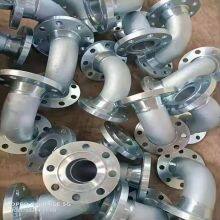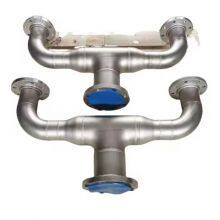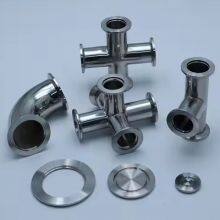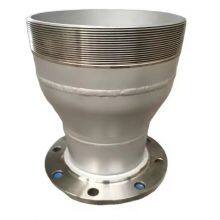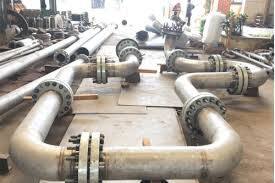ASME B31.3 B 16.5 Customized Spool Flange-flange SS/Nickel Alloy Pipe Fabrication Elbow Flange Spool End Pipe Spool Prefabrication
ASME B31.3 Customized spool flange-flange SS/Nickel Alloy pipe fabrication elbow flange spool end pipe spool prefabrication
ASME B31.3 Customized spool flange-flange SS/Nickel Alloy pipe fabrication elbow flange spool end pipe spool prefabrication
Pipe spools are fabricated from a number of raw pipes and pipe fittings (e.g. elbows, flanges, tees, etc.) in fabrication shops. Raw pipes are cut to the required sizes and moved with pipe fittings to a fitting table, where some of the components are fitted together (i.e. temporarily connected). The resulting sub-assembly (part of the final pipe spool) continues with welding operations (i.e. permanent connected) before it comes back to the fitting table and gets fitted with other spool components.
What Is Pipe Fabrication?
Pipe Fabrication is the manufacture of straight lengths of metallic pipe and piping components, which include wrought or forged elbows, tee and reducer fittings, forged flanges, and the pipe itself, to provide a simple or complex piping systems to safely transport or process liquids, gases, and solids.
Pipe fabrication plays a critical part of our society’s infrastructure, ensuring the commercial, institutional, and industrial facilities we rely on and work in, are safely designed, mechanically correct, and thoroughly tested or examined for the service the piping system was designed for. The fabrication of piping typically includes cutting, beveling, welding, and bending (or other pipe forming operations); and is performed by skilled tradespeople.
Pipe fabrication demands a high level of precision among hundreds of components with equally challenging assembly and installation processes. In any construction project where a network of piping is involved, pipe fabrication requires comprehensive planning, scheduling, and execution according to the design, location, timing, and budget requirements. In this blog, we’re breaking down all these moving parts, looking at the tools, equipment, planning, and other requirements that go into each step of the process.
As for the special alloy grades , we can provide over 100kinds of components as following
Austentic,super austientic 304 304L 309S 310S/H 314 316 316L 316Ti 317 321,30815,254S,904 926,8367
Monel 400 500 Nickel Alloy200 201 600 601 625 718 800/H/HT 825 Hastelloy C276 C22 C4 ,HB-2 HB-3 HB-4,G4 etc
Duplex, superduplex :32205 ,32750,32760,Zeron100,31803,
Copper Nickel(Cu-Ni) NS NO. C 70600 (CU -NI- 90/10) / C 71500 (CU -NI- 70/30) / C 71640 ( CU-NI-66/30/2/2) ASTM B165 , ASTM B163 , ASTM B829 , ASTM B775 ,ASTM B725 ,ASTM B730 , ASTM B751 others such as CuNi 10 14 19 23 30 34 40 44
Ti& Alloy :TA1、TA2、TA3、TA4、TA5 TA6 TA7 TA9、TA10、TA13、TA15、TA17、half TC4、TC4、TC10、TC11 GR1、GR2、GR3、GR4、GR5、GR7、GR9、GR12
(OD 3 -520mm WT:1-50 mm) Ti standard :ASTM B337,ASTM B338,ASTM B861,ASTM B862
Zirconium Zr-2(Zircaloy-2) Zr-4(Zircaloy-4)Zr-1Nb Zr-2.5Nb,R60702、R60704、R60705
Cobalt Hayness188,Haynes25(L-605),Alloy S-816,UMCo-50,MP-159,FSX-414,X-40,Stellite6
Ferro Niubium FeNb50 FeNb 60 FeNb 70
Others :409,446,403,410,410S,420,430 ,431,,439,440,PH17-4,15-5,17-7,15-7 ,630
1.4301,1.4306,1.4307,1.4401,1.4404,1.4410,1.4432,1.44621.4539,1.4541,1.4571,1.4435,1.4547,1.4550,,1.4539,1.4501,1.4571,1.4828,1.4841,1.4845, 2.4602 etc
Standard ASTM, 213,312,249, 269 ,270,358,409,554,688,778,789, 790 928 B161/163 B444 B462 B467 B514 B564 B637 B674 B677 B 725 B729 etc JIS G3459,JISG3463,JISG3446,(ANSI B 36.10- B 36.19 EN10217-7) 2014/68/EU ASME 16.9 A815 A182 EN10216,EN10217,EN10204,EN10296-2 GOST9941,EN10216,BS3605,GB13296 DIN17457,DIN17458 DIN 17459,JIS G3459,JIS G3463 or your local standard . the quality is assured by our strict testing lab equipment and experienced d analyst
Where Does Pipe Fabrication Take Place?
Some projects call for a field construction solution. Whether it’s more efficient, effective, or appropriate to fabricate pipe in the shop or on-site depends first and foremost on the size and scope of the project, but is influenced by numerous factors, including:
The weather
The pipe material and dimensions
Accessibility and safety concerns
Availability of on-site support personnel
Required welding facilities and resources
Scheduling and collaboration with other trades
If the project is for new or existing piping systems
Environmental and quality control needs
While piping can be fabricated in the field close to the pipe installation job site, for the purpose of this blog, we’re focusing on projects where the pipe fabrication is performed in a workshop and then transported to the job site for final installation. Pipe fabricators typically have a productive workshop facility to handle projects of various sizes. A purpose-built workshop that protects the worker and the work from the elements along with efficient machinery and equipment, and a skilled craft workforce makes Shop Fabrication the ideal response for most piping projects.
The Pipe Fabrication Process
Pipe fabrication is a detailed process from beginning to end. All engineering information, such as drawings, inspection and testing requirements, and applicable codes and standards related to the project, are all contained in a document called the Pipe Fabrication Specification. All pipes and their fittings must be manufactured and assembled according to the spool drawings in the pipe fabrication specifications. It’s also vital for pipe fabricators to consider the size of the assembly for transportation purposes. Subassemblies are often helpful in separating large projects into more manageable elements when moving between the shop and the project site.
Once the Pipe Fabrication Specification is solidified, the pipe fabrication process looks like this:
Marking: Pipe materials are marked and verified according to the Pipe Fabrication Specification.
Tagging: Pipe materials are tagged using a stamp or paint to ensure pipe heat numbers are displayed on all sections before cutting.
Cutting: Pipe cutting methods, such as a saws, gas torch, grinding, or plasma cutting, are chosen according to the type of steel or other metal in use.
End preparation: Beveling and fit-ups are completed following an approved specification and WPS.
Welding: Pipe welding planning ensures all seams will be positioned and aligned correctly in the final assembly.
Pipe and Fitting Welding: Pipes and fittings are supported and secured for a fit-up inspection. If passed, the joints are welded.
Details Marking: Various identifying details of the piping system, inspection details and signature, and welding date are marked near joints. The pipe spool number is marked with a paint marker and aluminum tag.
Heat Treatment: Preheating and PWHT may be completed depending on project requirements.
Inspection: Non-destructive testing ensures that all steps of the fabrication process have been completed and meet or exceed the project requirement and regulations. Piping that passes is released for painting or construction. Piping that does not pass must be repaired and reinspected. Piping that is to be painted will require another inspection prior to being released for construction.
Pipe Fabrication Tools and Equipment
However, many pipe fabrication tasks for small-volume projects or those with strict freight limitations may also be completed in the field. Regardless of where the work takes place, here are some of the key tools that allow pipe fabricators to create the countless complex precision piping systems that surround us.
Saws and Thermal Cutting Equipment
Rotating Equipment
Pipe End Finishers
Welding Machines & Equipment
Pipe Benders
Pipe Fit-Up Tools
Pipe Flangers
Rigging & Transportation Equipment
Pipe Jacks
Fork Lifts

Send Inquiry to This Supplier
You May Also Like
-
ASME B16.9 Customized Spool Flange-flange Stainless Steel Pipe Prefabrication Fittings Flange Spool Pipe Spool Prefabrication ServiceUS$ 40 - 80MOQ: 1 Piece
-
Stainless Steel Customized Pre-Fabrication of Piping Spools Stainless Pipe Spool Prefabrication ServiceUS$ 40 - 80MOQ: 1 Piece
-
1/4 1/8 3/8 1/2 3/4 Male Thread, BSPP/BSPT/ Metric/NPT SS304 SS316 FORGED Pipe Fitting Hex Nipple Hydraulic Fittings Hydraulic AdaptersNegotiableMOQ: 1 Piece
-
Factory Wholesale Hydraulic Hose Fittings High Pressure Ferrule Fitting SetUS$ 1 - 8MOQ: 1 Piece
-
Crimp Fittings 316 Compression Tube Fittings Double Ferrule Tee Double Union Compression Tee AdaptorUS$ 1 - 8MOQ: 1 Piece
-
Stainless Steel316 High Pressure PT NPT Thread Double Ferrule Tube Connector 316L Stainless Steel Hydraulic FittingsUS$ 1 - 8MOQ: 1 Piece
-
Female Male Thread, BSPP/BSPT/ Metric/NPT SS304 SS316 FORGED Threaded Fitting Hex Nipple Hydraulic Fittings Hydraulic AdaptersNegotiableMOQ: 1 Piece
-
Flareless Bite Type AdapterTube x NPT Male Straight Adapter Female Male Thread, BSPP/BSPT/ Metric/NPT SS304 SS316 FORGED Fittings AdaptersNegotiableMOQ: 1 Piece
-
Flareless Bite Type Tube Union Flareless Bite Type Adapter Tube x NPT Male Straight Adapter Female Male Thread,NegotiableMOQ: 1 Piece
-
Flareless Bite Type Flareless Bite Type Tube Union Flareless Bite Type Adapter Tube x NPT Male Straight Adapter Female Male Thread,NegotiableMOQ: 1 Piece


